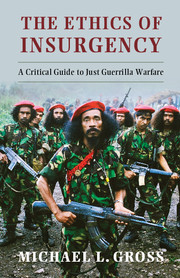Description
The Ethics of Insurgency
A Critical Guide to Just Guerrilla Warfare
Author: Gross Michael L.
The Ethics of Insurgency explains how guerrillas who pursue national self-determination may justly utilize many unlawful practices of war.
Language: English
Subject for The Ethics of Insurgency:
Approximative price 62.51 €
In Print (Delivery period: 14 days).
Add to cart
The Ethics of Insurgency
Publication date: 01-2015
320 p. · 15.7x23.5 cm · Hardback
Publication date: 01-2015
320 p. · 15.7x23.5 cm · Hardback
Approximative price 35.19 €
In Print (Delivery period: 14 days).
Add to cart
The Ethics of Insurgency
Publication date: 01-2015
337 p. · 15.2x22.6 cm · Paperback
Publication date: 01-2015
337 p. · 15.2x22.6 cm · Paperback
Description
/li>Contents
/li>Biography
/li>
As insurgencies rage, a burning question remains: how should insurgents fight technologically superior state armies? Commentators rarely ask this question because the catchphrase 'we fight by the rules, but they don't' is nearly axiomatic. But truly, are all forms of guerrilla warfare equally reprehensible? Can we think cogently about just guerrilla warfare? May guerrilla tactics such as laying improvised explosive devices (IEDs), assassinating informers, using human shields, seizing prisoners of war, conducting cyber strikes against civilians, manipulating the media, looting resources, or using nonviolence to provoke violence prove acceptable under the changing norms of contemporary warfare? The short answer is 'yes', but modern guerrilla warfare requires a great deal of qualification, explanation, and argumentation before it joins the repertoire of acceptable military behavior. Not all insurgents fight justly, but guerrilla tactics and strategies are also not always the heinous practices that state powers often portray them to be.
1. Just guerrilla warfare: concepts and cases; Part I. The Right to Fight: 2. The right to fight: just cause and legitimate authority; 3. The right to fight: who fights and how; Part II. Hard War: 4. Large-scale conventional guerrilla warfare: IEDs and ballistic missiles; 5. Small-scale conventional guerrilla warfare: targeted killing and taking prisoners; 6. What's wrong with human shields?; Part III. Soft War: 7. Terrorism and cyber terrorism; 8. Economic warfare and the economy of war; 9. Public diplomacy, propaganda and media warfare; 10. Civil disobedience and nonviolent resistance; Part IV. Concluding Remarks: 11. Just war and liberal guerrilla theorizing.
Michael L. Gross is a professor in and the head of the School of Political Science at the University of Haifa, Israel. His articles have appeared in Political Studies, Social Forces, the New England Journal of Medicine, Political Research Quarterly, the Journal of Applied Philosophy, the American Journal of Bioethics, the Journal of Military Ethics, the Journal of Medical Ethics, and Political Psychology. His books include Ethics and Activism (Cambridge University Press, 1997), Bioethics and Armed Conflict (2006), Moral Dilemmas of Modern War: Torture, Assassination and Blackmail in an Age of Asymmetric Conflict (Cambridge University Press, 2010), and an edited volume, Military Medical Ethics for the 21st Century (2013). He serves on regional and national bioethics committees in Israel and has led workshops and lectured on battlefield ethics, medicine, and national security for the US Army Medical Department at Walter Reed Medical Center, the US Naval Academy, the International Committee of Military Medicine, the Dutch Ministry of Defense, and the Medical Corps and National Security College of the Israel Defense Forces.
© 2024 LAVOISIER S.A.S.




